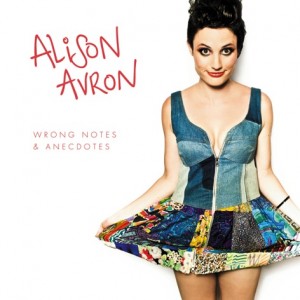ep review: alison avron, wrong notes & anecdotes

Listening to Alison Avron‘s debut EP, Wrong Notes & Anecdotes, one senses the overwhelming positive energy alive within these tracks. It’s this joyfulness which makes it such an addictive listening experience.
Hailing from Glencoe in rural South Australia, Avron moved to Sydney’s inner-west to establish her own creative space called The Newsagency: a venue which hosted the official release of this EP. Consisting of four tracks, it is deceptively dense. In the great tradition of pop, one is familiar with each track by the time its second chorus comes around. However, there is a depth to the arrangements which rewards repeated listens – and its infectiousness guarantees that you will want to revisit these songs. Like the best of AM radio from eras bygone, there is a liveliness permeating this release. Its elation is contagious.
‘Happy Stories’ opens the EP. With its irresistibly catchy bass line (courtesy of Zoe Hauptmann) and rhythm guitar (Adam Moses), from the outset it is clear that Avron has surrounded herself with a very talented group of musicians (Evan Mannell on drums, Stu Hunter on keyboards and James Hauptmann on percussion complete her studio band). It’s the most “live” track on offer and really does showcase the band’s musicianship.
‘Oo Ee Oo’ is a curious mixture of 80s pop, 60s soul and a chorus which brings to mind the lighter moments of Goldfrapp’s more recent output. Yet somehow it works. Avron has a voice which can delight, even when she’s singing lyrics composed entirely of vowels.
The superbly produced ‘Bitter Little Yellow Fruit’ is compositionally the most interesting song on the release. It’s also the darkest. Combining programmed percussive elements, understated textural sequencing and gorgeous acoustic guitar, a dramatic mix of the organic and synthetic results to create a powerful goth-tinged torch song. On an EP heavy with good vibes but light-on in terms of varied instrumentation, ‘Bitter Little Yellow Fruit’ provides some much-needed aural variety, both stylistically and thematically. A highlight.
Returning to the 60s with EP-closer ‘Happy (To See You)’, Avron channels the catchiest moments of the Jackson 5 and Stevie Wonder to leave the listener unable to resist moving something. Surprisingly, this is one of the few moments on the release to feature Avron’s vocals without noticeable audio effects. It is however a welcome surprise as the absence of effects helps to elevate this vocal performance above those on earlier tracks. When Avron’s voice sounds as strong as this, one wonders why there is a reliance on over-compressed and double-tracked vocals earlier on the EP.
There’s a joy at work here that goes beyond the sunny lyrics, bouncy bass lines and pop hooks. It’s the joy of making music simply to make other people happy. That is the most generous reason to make art. Despite the fact this is a short release at only 12 minutes, it is certainly a generous one.
Alison Avron puts it perfectly – “Happy stories, happy endings”.

